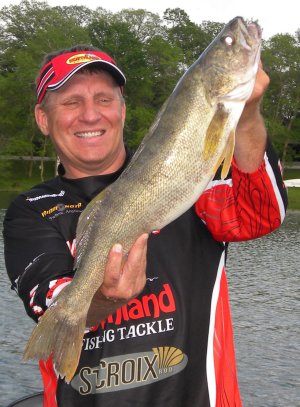
Much has been made in recent years over the development of soft plastic fishing baits and artificial lures. Those baits do work and I catch my share of fish using them. I still believe, however, that nothing beats live bait in some fishing situations, particularly when walleyes are involved.
Early in the fishing season, a jig and minnow combination is still hard to beat on lots of bodies of water. In fact, Fire-Ball Jigs in the 1/16 and 1/8-ounce sizes tipped with shiners, fatheads, or some sort of chubs put lots of early-season walleyes in the boat for this fishing guide and my clients.
When jigs won’t produce, I often go to an even more natural presentation, one utilizing a slip-sinker live bait rig like a Roach Rig again baited with a very lively minnow. This presentation, when dangled in the faces of a school of reluctant walleyes, seems to at least trigger a few bites when all else fails.
Many would agree that live bait is often hard to beat when spring walleyes are the target. Later in summer, when the water warms and the walleyes seem more willing to chase artificial baits, many anglers go to soft plastic baits fished on jigs or crankbaits cast or trolled behind the boat. Those techniques certainly work. For me, however, I break out the bottom bouncers, bait them with some live “meat” and go to work.
A heavy 1 1/2- to 2-ounce Rock-Runner Bottom Bouncer fished in conjunction with a plain snell and baited with a nightcrawler or leech becomes this guide’s “go-to” rig when walleyes move from the shallows of spring to deep water structure in the summer. This set-up, when fished in a vertical fashion, presents live bait in a natural manner, yet still can be used to incorporate some bite-triggering speed into the equation.
A Super-Glo Attractor hook and a bead are all that is needed for attraction with this rig. Fishing the set-up over deep water points and underwater humps have become a staple of my summer walleye guide trips. I often travel one-half to one mile per hour with this rig picking off active walleyes as I go.
Super-Glo chartreuse and orange-colored hooks fished with similarly colored beads work well for me. Last summer, however, the glo-pink hook produced very good catches as well. I’m not sure that a particular color is as important as just having some color for a bit of attraction.
A bouncer/plain snell set-up is dynamite during summer when fish school on deep structures. Another set-up using a bottom bouncer and live bait, this one incorporating a spinner, also works.
When the fish seem to be receptive to even more speed, or are scattered along large main-lake sunken islands and reefs, a bottom bouncer/spinner baited with a leech or nightcrawler is very effective. In this situation, I opt for at least a 2-ounce bouncer and kick the speed up a bit.
A variety of spinner harnesses will catch walleye behind bottom bouncers. Last summer, the new Live-Forage Crawler Hauler accounted for good catches. The high-definition blades on these rigs provide the flash and vibration needed to trigger walleye. Plus, they come with a pair of premium hooks that are lethal when it comes to hooking walleyes.
The Yellow Perch and Gold Perch blades worked great last summer, but the other bait fish patterns offered on these rigs are sure to put walleyes in the boat as well. As with any fishing situation, experimentation is the best way to determine the best fish-catching color on any given day.
Regardless of whether pulling a spinner or plain snell rig, it is solid advice to keep the bottom bouncer on the bottom but fish as vertically as possible. Bouncers fished in this fashion resist snags and incorporate a stop-and-go, stuttering action that really seems to trigger walleyes into biting.
Triggering walleye bites is the goal on many fishing trips. While artificial baits and lures do catch fish, lots of situations still call for tried and true live bait techniques. So please pass the live bait. It’s probably all you will need for more walleyes this summer!

